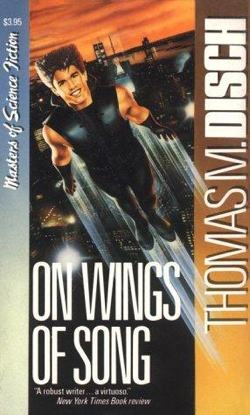When I wrote about Samuel Delany’s Nova, I said that if it was published today it would still be a book we’d be excited about. I can say the same about Thomas M. Disch’s On Wings of Song. On Wings of Song was nominated for the 1980 Hugo and won the 1980 Campbell Memorial Award. It was published in 1979, but it doesn’t at all read as if it was. It’s set in a satiric dystopic future collapsed USA, where the country has fragmented and the economy has gone to pieces. It reads as if it could still be the future—I mean it doesn’t have cell phones and the internet, but then it makes sense that it wouldn’t.
It’s a fascinating complex world. There are machines which you hook up to and sing sincerely, and if you do it right you have an out of body experience. They call this flying, and it’s banned in the same way that drugs are banned—illegal but available. The world is also full of phoneys, white people who dye their skin black for personal reasons, fashion reasons, to please their partners, or just to get on. They always leave one part white though, sometimes a finger, sometimes the tip of their nose. There are famines when rations get cut to starvation levels, and prisons where you have to get McDonalds takeout to survive. There are rich people and there are people who have to hustle to get by, and there’s a movie called Gold Diggers of 1984, and Bel Canto is a popular artform.
We don’t seem to have a word to describe the kind of story this is. It’s the whole life story, from age five to death, of Daniel Weinreb. He lives in New York and then in Iowa, with one trip to the bright lights of Minneapolis, and then back in New York. He spends a while in prison for distributing the Minneapolis Star Tribune in Iowa—I was so surprised when I found out that was a real newspaper! He wants to fly, he wants it more than anything. His life is complicated and largely unheroic, the kind of life people actually have in reality and seldom have in fiction. But it’s a life he could only have in that time and place, in the world he lives in. It’s a book about how he grows up and what happens to him and what he wants and what he has to do to get by.
The book is depressing and hilarious in a way that’s very hard to describe. Most of Disch is brilliant and depressing, this is brilliant and depressing and moving and funny. I can talk about the world, and if I wanted to do spoilers I could talk about Daniel and the plot, but I can’t possibly describe to you the experience of reading the book. The best I can do is to say that it’s as if Dostoyevsky and Douglas Adams collaborated on the Great American novel.
You really want to read On Wings of Song. You might not like it, but it’s one of the books that marks the boundaries of what it’s possible to do with SF—still right out there on the edge, thirty years on.
And furthermore, somebody should reprint it.
Jo Walton is a science fiction and fantasy writer. She’s published two poetry collections and nine novels, most recently Among Others, and if you liked this post you will like it. She reads a lot, and blogs about it here regularly. She comes from Wales but lives in Montreal where the food and books are more varied.










